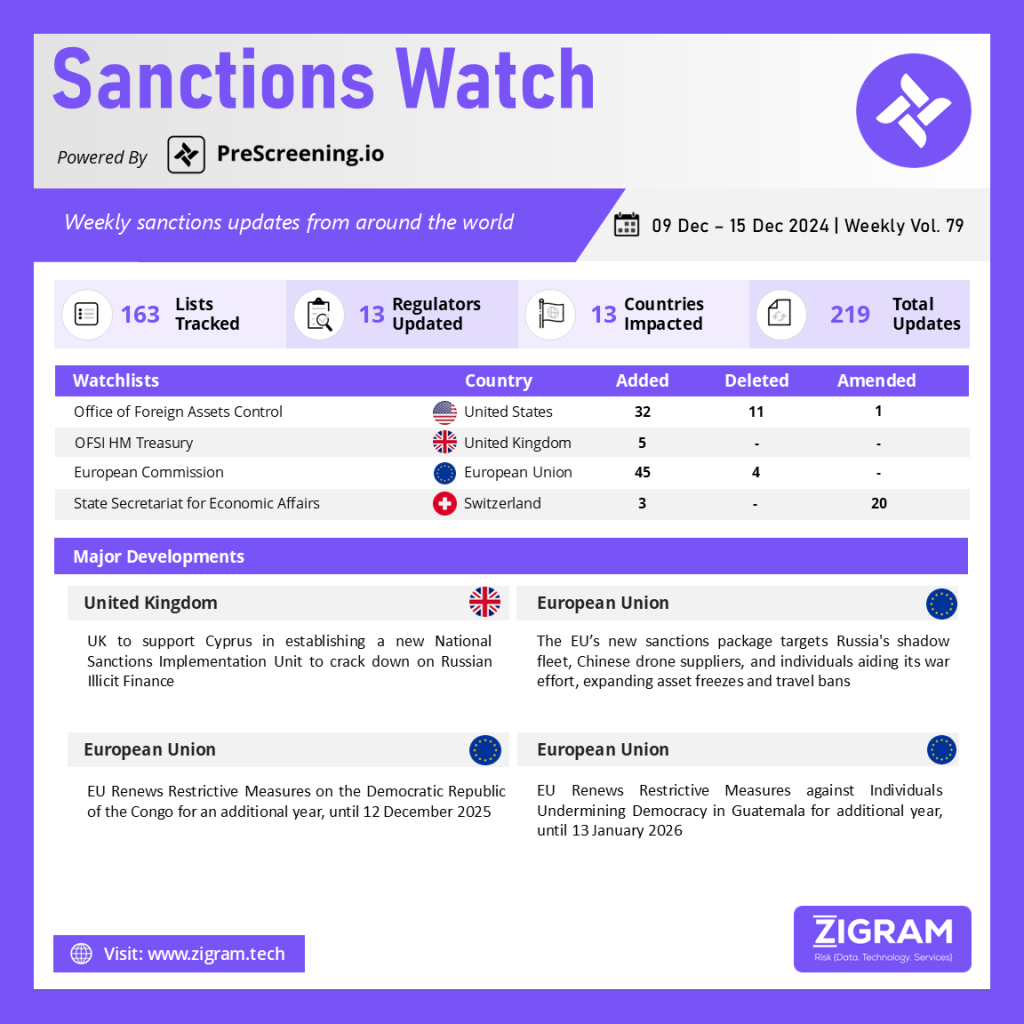Sanctions Watch Vol 79
In the latest edition of our Sanctions Watch weekly digest, we present significant updates on sanction watchlists and regulatory developments.
1. UK to support Cyprus in establishing a new National Sanctions Implementation Unit to crack down on Russian Illicit Finance
The UK has partnered with Cyprus to establish a new National Sanctions Implementation Unit, aimed at curbing illicit Russian finance across Europe. The initiative was agreed upon by UK Prime Minister Keir Starmer and Cypriot President Nikos Christodoulides during the first UK-Cyprus bilateral visit in over 50 years.
The unit will enhance intelligence-sharing between the UK’s Office of Financial Sanctions Implementation, Office of Trade Sanctions Implementation, and Cyprus’s Ministry of Finance. Equipped with advanced analytical tools, the unit will investigate sanctions evasion and track illicit funds, strengthening the effectiveness of sanctions against Russia.
This collaboration also extends to tackling serious organized crime. The UK will share expertise on the registration of beneficial ownership of assets and deliver financial crime training for Cypriot law enforcement through the National Crime Agency. HMRC will upskill customs officers in Cyprus, bolstering efforts to disrupt smuggling and illicit tobacco flows, aligning with the UK’s mission to ensure safer streets.
Cyprus has frozen £1.5 billion in Russian assets since the invasion of Ukraine and joined the UK-led Shadow Fleet initiative to counter sanctions evasion. This deepened cooperation reinforces both nations’ commitment to safeguarding global security and choking Russia’s war machine.
2. EU adopt new Sanctions Package Targeting Russia’s Shadow Fleet and Chinese Drone Makers
The European Union has agreed on a 15th package of sanctions against Russia, focusing on its shadow tanker fleet and Chinese firms supplying drones to Moscow, diplomats confirmed. The sanctions package is aimed at further curtailing Russia’s ability to sustain its war in Ukraine. It includes measures targeting vessels from third countries supporting Russia and introduces additional restrictions on individuals and entities aiding the war effort.
European Commission President Ursula von der Leyen highlighted the significance of the measures, emphasizing the targeting of Russia’s shadow fleet. The Hungarian presidency stated that the sanctions will address vessels aiding Russia, expand the sanctions list, and freeze assets of over 50 individuals, nearly 30 entities, and 45 tankers.
Diplomats also confirmed a six-month extension for the Czech Republic to import Russian oil-based products via Slovakia. The package, once formally adopted by EU foreign ministers on Monday, will add to the current sanctions list, which includes 2,200 individuals and entities subjected to travel bans and asset freezes within the EU.
This latest round of sanctions underscores the EU’s commitment to countering Russia’s war machinery by tightening economic and logistical restrictions on its operations.
3. EU Renews Restrictive Measures on the Democratic Republic of the Congo for Another Year
The European Council has extended its restrictive measures concerning the Democratic Republic of the Congo (DRC) until 12 December 2025, targeting 23 individuals and one entity. These sanctions address human rights violations, electoral obstruction, and actions fueling armed conflict, instability, and insecurity in the region.
The measures impose an asset freeze and prohibit EU citizens and companies from providing funds to the sanctioned individuals and entity. Additionally, affected individuals face travel bans, barring entry or transit through EU member states.
Initially adopted in 2016, these measures respond to grave human rights abuses and electoral disruptions in the DRC. In December 2022, the EU expanded the criteria to include sanctions against entities and individuals who support or benefit from armed conflict, instability, or the illicit exploitation and trade of natural resources in the region.
The EU maintains continuous monitoring of the DRC’s situation and retains the authority to renew or adjust the sanctions list based on on-the-ground developments.
These measures underscore the EU’s commitment to addressing the root causes of instability and promoting accountability in the DRC.
4. EU Renews Restrictive Measures against Individuals Undermining Democracy in Guatemala
The Council of the European Union has extended its targeted restrictive measures against individuals in Guatemala for another year, until 13 January 2026. These measures are directed at five individuals identified as responsible for actions undermining democracy, the rule of law, and the peaceful transfer of power. The restrictions include travel bans within EU member states and asset freezes, alongside prohibitions on EU citizens and companies providing them with funds. Additional measures may be introduced if democratic governance in Guatemala continues to face challenges.
The EU remains deeply concerned about the misuse of Guatemala’s justice system, particularly efforts to overturn the results of the 2023 general elections and attacks on the democratically elected government led by President Bernardo Arévalo. The EU underscores its commitment to supporting democracy, the rule of law, and the will of the Guatemalan people as expressed in the 2023 elections, which were deemed credible by the EU Election Observation Mission.
The EU is prepared to collaborate closely with President Arévalo’s government on strengthening governance, promoting sustainable development, and advancing social justice. The measures aim to uphold democratic principles and protect the rights of the Guatemalan population during this critical period of transition.
Know more about the product: PreScreening.io
Click here to book a free demo.
Sanctions Watch is a weekly recap of events and news related to sanctions around the world.
- #Sanctions
- #RegulatoryCompliance
- #FinancialSanctions
- #UNSanctions
- #ComplianceMatters
- #GlobalGovernance
- #AML
- #KYC
- #RestrictiveMeasures
- #EconomicSanctions
- #SanctionsWatch
- #InternationalSanctions
- #EconomicSanctions
- #RegulatoryCompliance
- #TradeCompliance
- #SanctionsEnforcement
- #SanctionsViolations
- #SanctionsLaw
- #RegulatoryUpdate
- #GlobalCompliance
- #UNODCSupport
- #EconomicSanctions
- #SanctionsRegimes
- #SustainableGovernance
- #InternationalLaw
- #ConflictResolution
- #SanctionsRegimes
- #UkraineSupport
- #ChineseDrones
- #FinancialInstitutions
- #Guatemala
- #RussiaSanctions
- #ShadowFleet
